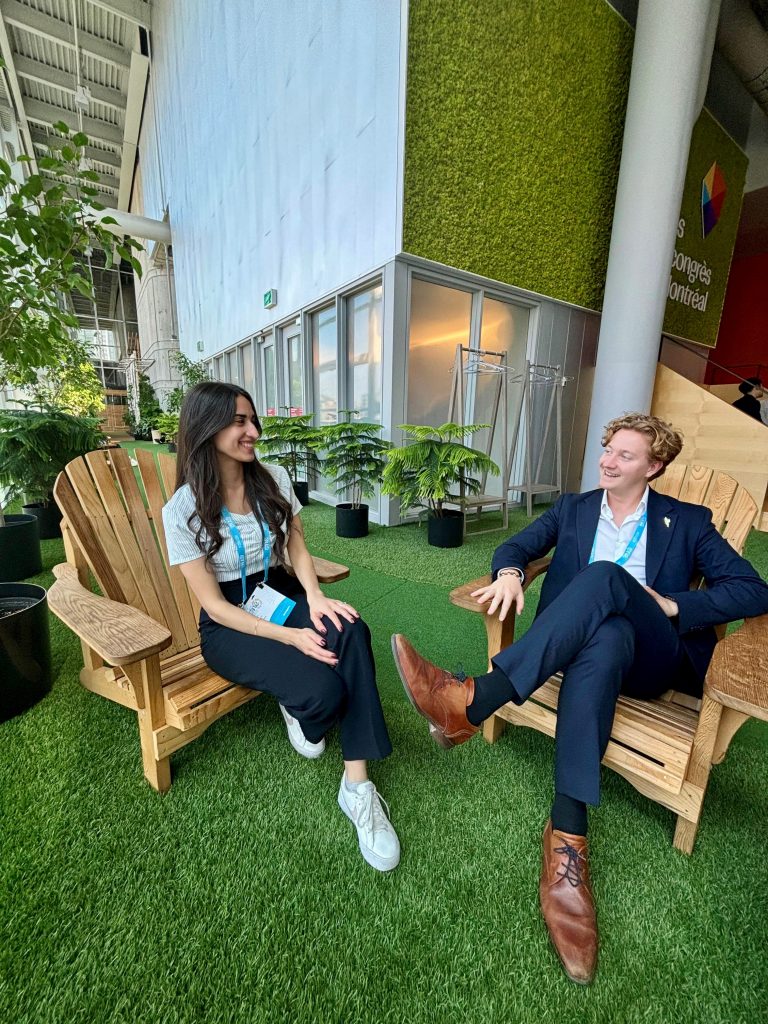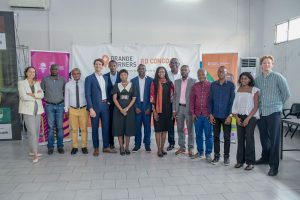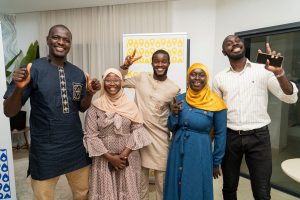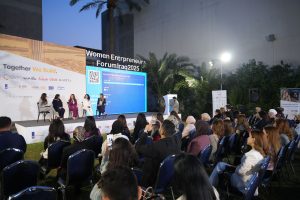Meet Orange Corners Palestinian Territories graduate Loor Masri, who has made impressive strides in empowering young entrepreneurs across the Arab world. As the co-founder of LaCom, she offers young Arab business leaders a dynamic platform with vital resources – workshops, podcasts, mentorships and more – to help them navigate their local business landscape in their own language. We sat down with Loor to learn more about LaCom during the One Young World Summit in Montréal, Canada, where she was on a scholarship from the NL Ministry of Foreign Affairs and Orange Corners.
Hi Loor, lovely to have you here! Could you introduce yourself and your business?
Happy to be here! My name is Loor Masri from Palestine and I’m the co-founder of LaCom Magazine for YoungPreneurs. LaCom is an all-in-one business and entrepreneurship magazine for Arab youth. We offer workshops, podcasts, ecosystem mappings and a platform where young entrepreneurs can meet mentors from the MENA region as well as companies supporting youth, such as incubators, accelerators and banks.

A recent study found that although Arabs are the fourth-ranking readers worldwide, less than two per cent of online content is in Arabic. This is also the case for business and entrepreneurship content. With LaCom we want to shed light on young entrepreneurs and their successes and even failures. Because especially in the MENA region you often hear about super successful entrepreneurs, but you never hear about the struggling little ones, who are also making a difference, making impact. Arabic countries are often seen as ‘third world countries’ or ‘less developed’, but I believe that we have a lot of potential. We just need to use it!
Arabs are the fourth-ranking readers worldwide, but less than two per cent of online content is in Arabic.
Loor Masri, LaCom
How did you come up with the idea for LaCom?
Our family already published a magazine, Middle East Business Magazine & News. It was founded by my mother Amal 12 years ago, and my sister Yara and I wrote articles for this magazine directed at youth. The content was very serious though, and when we saw how much young people liked the content we published, we thought we could create a similar magazine for youth. Personally, whenever I’d look up online articles, research, case studies and other business content in English, I couldn’t really relate to it, as it was never about the MENA market. And since we already had experience publishing magazines, we decided to fill this gap ourselves. So we started LaCom Magazine for YoungPreneurs, an online business magazine. Our family business provides us with a space, equipment and connections.
We immediately got a lot of traction. It all happened in just two weeks. I’m responsible for marketing and PR, I had to build a website myself. Yara did the content. It started from there, as a magazine, but then we expanded into a platform where people can find all resources that they need in Arabic. Mentorship, workshops, content, podcasts and so on. That’s how it started. Right now, we’re working with more than ten local universities on different projects and we hope to expand even more, creating more impact.
Our audience is from all over the MENA region. Our top readers are from the Gulf states, from the UAE and Saudi Arabia. There’s also a lot of interest from the countries surrounding Palestine: Egypt, Lebanon, Syria and Jordan, along with Libya and other Arab countries. There’s also a lot of people from the US visiting our website, possibly Arabic-speakers in the US. Some readers suggested that maybe we should also offer content in English, so we’re looking into this.

What does your business model look like?
LaCom is free to read to everyone, no one has to pay anything. We have a B2B business model, which means that companies targeting youth can publish through us. As a media outlet we do event coverage, outreach and communication efforts for different projects and we publish written content through articles and press releases, along with sponsored podcast episodes.
The last one was Palestine Launch Padin collaboration with SPARK and Udacity and sponsored by Google. We worked directly with SPARK to contact universities, banks and the private sector, in an effort to get their buy-in and reach their students. Through these efforts we got a lot of student and professional submissions for the Nanodegree scholarships that Google and Udacity offer. LaCam was responsible for the outreach. So the big corporates targeting youth, they’re the ones paying.
We also have some sponsored podcast episodes. For example, a bank could sponsor an episode with an entrepreneur. This helps us to buy equipment and cover our working hours. Some companies also pay yearly for a subscription for a continuous press release on whatever is going on in their companies, but also email distributions, articles, basically just content. So that’s how it works, the audience is youth, but the businesses pay for the content.
Orange Corners helped us integrate more in the community, get a better understanding of what we’re doing, the market and where we should be heading.
Loor Masri, LaCom
How did you come to Orange Corners?
That’s a funny story actually. When we first started our magazine, we were not integrated in the startup system in Palestine, which is growing rapidly. There are a lot of incubators and accelerators, a lot of startups and founders. But when we were building the magazine, at some point we came to the conclusion that we didn’t have that mentor which could make sure we’re following the right path, using the right tools and reaching the right people. Knowing Majd, Leen and the Flow team, we read on social media that they were accepting applications for Orange Corners, and we decided to apply because we heard a lot about Orange Corners and the programme was in the hands of people that we trusted. We also heard good things from other alumni like Samah Ayyad, who was very positive about the programme. And it was an amazing experience, Orange Corners helped us in so many ways.
What benefited us most were the workshops, especially the sessions on how to build your product in accordance with your audience. You need to take them into consideration, it’s not about what you think is best, but what resonates with your audience. We also met a lot of mentors, who were very helpful and open for us to reach out to. We found the funding at the end also helpful. This allowed to expand from just a magazine to a platform. We were also able to buy a camera for the podcast, which was great.
I think Orange Corners helped us integrate more in the community, get a better understanding of what we’re doing, the market and where we should be heading.
We’re in Montréal, Canada today. How did you end up here at One Young World?
I was approached by someone very kind on LinkedIn who worked with One Young World, and they let me know that there’s a scholarship from the Netherlands, specifically for young entrepreneurs. I already applied for One Young World three times. It didn’t work out before, but it’s something I’ve wanted to be part of for a while. To have that opportunity to come here is amazing. It’s my first time in Canada, my first time in Montréal. The city is amazing, the people are lovely and the conference is overall very positive. Everyone is so incredibly positive, so kind. I got to meet a lot of people from different corporates and companies, a lot of entrepreneurs. I’m really enjoying this and I hope to come back next year.

What do you take home with you after the summit?
The summit restored my faith in my work and my impact. It also restored my faith in youth. What I saw these past few days was that everyone’s really looking to change something. They’re hard-working, open to new possibilities. We often tend to isolate ourselves within our work, forgetting that what we do actually matters. We have a voice and we can make a difference. I’ll go home with a lot of fresh energy to work even harder.
Now that you’ve participated in Orange Corners and One Young World, what would you say to Dutch policy makers about how we can support young people even better?
First of all, I think what you guys are doing is amazing, and just the thought that the Netherlands cares this much about youth is truly touching. I met the Orange Corners HQ team in Ramallah, when there were conflicts going on and they still insisted on coming and listening to us. That alone was absolutely amazing. It made me want to participate in what else you guys would do in the future. It made me put a lot of trust and faith in you.
In terms of the programme itself, it could sometimes maybe be a bit deeper on certain topics. Sometimes I’d go to the lecture and I already had certain things established that we were taught about, so I’d have little take-aways. Having a more advanced follow-up programme would be beneficial. Also, it’d be interesting to have mentors coming in from the specific industries that the startups are active in. For example, I’d really like to have a mentor from the media industry, someone that I can relate to. The programme is amazing, but it could be deeper. We like to be pressured, even if there are a lot of assignments and things to do.
What’s it like being a Palestinian entrepreneur today?
Being an entrepreneur and being Palestinian is the same as being an employee and being Palestinian. It’s all the same. But it’s especially hard to have a startup, because our market is very much dependent on political and economic developments. The war in Gaza has given us so much trouble financially. Our B2B clients are facing their own obstacles, because the market is going up and down. There’s a lot of uncertainty, and the political situation isn’t helping. This definitely affects the speed of our progress, our income, it affects everything. If it weren’t for my parents’ company supporting us, we wouldn’t have been able to move on.
For the technical part, being geographically limited – to say the least – makes it difficult to scale up our business to other countries. You need to be somewhere physically to establish connections and partnerships. Although our readers are from all over the MENA region, our customers are Palestinian only. Outside customers still have some hesitations to participate. And what has been most frustrating is that people I know from Gaza are getting killed. So sometimes it’s really hard to find the motivation work and be productive.
As Palestinians, we live day to day. And just like any other business, small or big, you have to lift up your sleeves and dive into the mud.
Loor Masri, LaCom
How do you deal with that?
You don’t really deal with it necessarily, you just kind of have to live day to day. You have to do your duty to talk about Palestine and follow the news 24/7. You have to know what’s going on. That’s the least we can do.
And just like any other business, small or big, you have to lift up your sleeves and dive into the mud. That’s always been the case, not just because of the war in Gaza. To an extent we’re used to it, to the extent that we don’t feel strongly about things anymore. We’re just like: this is life, we have to accept it and find a way to succeed. That’s it, it’s mostly just resilience.
What are your future plans?
I want LaCom to be the number one trusted source for youth for Arabic-language content on entrepreneurship. My dream is to have a magazine as big as leading business magazines in the Gulf, like Forbes Middle East and Entrepreneur Middle East. I hope that I can reach that stage, because they inspire me and I think with the right direction, right team, right mentorship, right motivation and the right work, we can get to that stage. We also love to do events to reach more youth across the Middle East.

What’s your advice to people that are just starting with their business?
I wouldn’t call my business super evolved yet. I was talking to a friend yesterday, saying how although my sister and I have been working on this for the past 3-4 years, it still feels like we’re right at the beginning and we have such a long way to go. But my most important advice would be to stay dedicated. If you’re going to start a business for the money, don’t start it. If you do it for the money you aren’t going to find the right motivation for it later. But if you have faith and belief in it, you’ll progress. Also, invest in your team, invest in your equipment, invest in your studies, get certificated, learn online about your industry. Don’t let your pride or ego hold you back, because ego can destroy a person. But believe in yourself and have the right community around you!
Read Loor’s LaCom online:
Website
LinkedIn
Facebook
Instagram





